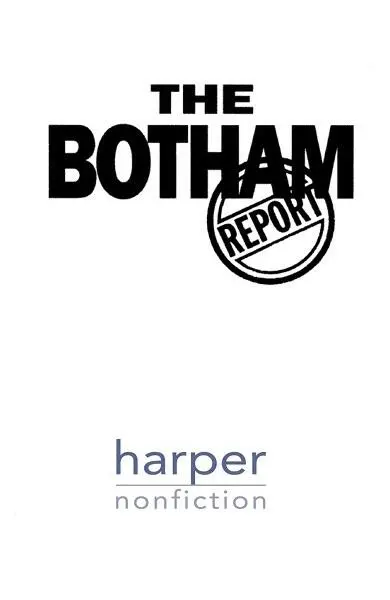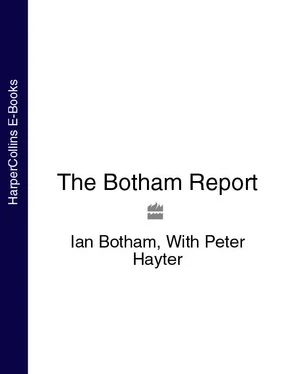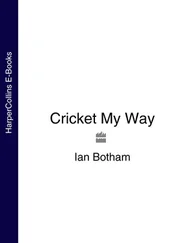
 COPYRIGHT
COPYRIGHT
HarperNonFiction
An division of HarperCollins Publishers Ltd. 1 London Bridge Street London SE1 9GF
www.harpercollins.co.uk
Copyright © Mannez Promotions Ltd 1997
First published in hardback in 1997 by CollinsWillow
Photographs supplied by Allsport, Patrick Eagar and David Munden
The Author asserts the moral right to be identified as the author of this work
A CIP catalogue record for this book is available from the British Library
All rights reserved under International and Pan-American Copyright Conventions. By payment of the required fees, you have been granted the nonexclusive, nontransferable right to access and read the text of this ebook on-screen. No part of this text may be reproduced, transmitted, downloaded, decompiled, reverse-engineered, or stored in or introduced into any information storage and retrieval system, in any form or by any means, whether electronic or mechanical, now known or hereinafter invented, without the express written permission of HarperCollins ebooks
HarperCollins Publishers has made every reasonable effort to ensure that any picture content and written content in this ebook has been included or removed in accordance with the contractual and technological constraints in operation at the time of publication
Source ISBN: 9780002187718
Ebook Edition © JANUARY 2017 ISBN: 9780007582044
Version: 2017-01-18
To my long-suffering family: Kathy, Liam, Sarah, Becky, and the equally long-suffering supporters of English cricket
Cover
Title Page
Copyright
Dedication
A Game in Crisis
Ten Years of Hurt 1987–1997
Introduction
1 From Heroes to Zeroes
2 Ted Lord and his Brave New World
3 ‘One Man’s Meat …’
4 The Demise of Dexter
5 Illy’s Change of Plan
6 The Final Say
7 A Dirty Business
8 Dad’s Army
9 Illy Takes Charge
10 Disarming Devon
11 End of the World
12 The Graveney Fiasco
13 Murder in Bulawayo
1997 Ashes to Ashes
14 The New Order
15 Atherton’s Dream
16 Still Dreaming
17 ‘Good morning, Michael’
18 Make That Eleven Years
How Not to Run English Cricket
19 Marking Time: The Nicholas Affair
20 Trouble with Patrick
21 Liam’s Choice
22 Pills and Ills: The Burn Out Factor
Botham’s Blueprint
23 The Questions
24 The Answers
Picture Section
Acknowledgements
About the Publisher
‘English cricket is in crisis, of that there is no doubt’
On Saturday 28 December 1996, the third day of England’s second Test against Zimbabwe in Harare, English cricket celebrated a bittersweet tenth anniversary.
It was ten years to the day when, on the 1986–87 tour of Australia, under captain Mike Gatting, England last won the Ashes; ten years to the day when England’s descent to the bottom rung of international cricket began.
I remember the moment we achieved what Englishmen regard as the ultimate cricketing goal as though it was yesterday. One-nil up in the series with two matches to play, we arrived at Melbourne for the Christmas Test, confident that we would achieve the result that would give us the series. Our confidence was not misplaced. We won in three days and we were that good. Gladstone Small and I both took five wickets to dismiss the Australians for fewer than 150, then Chris Broad hit a century to set up victory by an innings. How sweet a moment it was when Merv Hughes swung a delivery from Phil Edmonds, our left-arm spinner, into Gladstone’s hands on the square leg boundary to bring the match to an end and signal the start of our celebrations.
Ten years later, on that fateful day in Harare, England were being bowled out by a team representing a country that wasn’t even playing Test cricket when we last won the Ashes, dismissed for 156 in less than a full day’s play. It was one of the most pathetic batting performances I’ve seen from an England team, but the fact that the overwhelming public reaction to it was one of resignation rather than shock underlined just how far English cricket had fallen during a decade in the doldrums.
Then Zimbabwe’s young fighters completed England’s indignity by winning the two final one-day games of the three-match series to secure a 3–0 whitewash.
David Lloyd, the England coach, on his first senior overseas tour, had already suffered ridicule back home for his comments after the tied first Test in Bulawayo, when, after a fracas with an official of the Zimbabwean Cricket Union he claimed, ‘We murdered them. We hammered them. They know it, and we know it.’ The team had also earned a reputation, unfair or not, for surliness.
For the armchair critics back home, England’s final one-day defeat by 131 runs was meat and drink. Conservative MP Terry Dicks tucked in with the greatest relish. He said, ‘I think the tour should be abandoned now. They should not be allowed to go out to the sun in New Zealand. They should be brought home in disgrace.’ Now really gorging himself, he carried on, ‘I would sack the management and half the team. I have never been so ashamed to be English.’ Another Tory MP, Bill Cash, said English cricket had reached a new low. ‘We have got to shake the whole thing up and produce some new talent,’ he said. It wasn’t just the rent-a-quote politicians who climbed into England. The former England captain Brian Close, my mentor as a young player at Somerset and a man whose opinions on cricket are usually direct and to the point said simply, ‘The players want their arses kicking.’
Despite occasional upturns in form and the undoubted enthusiasm of new coach Lloyd, the underlying theme running through England’s performances during 1996 was that as a cricketing nation we were going nowhere fast. The statistics said it all: nine Test matches were played in the twelve-month period, one against South Africa, three against India, three against Pakistan and two against Zimbabwe. England managed one solitary victory, the first Test of the summer against India at Edgbaston. They lost three, the first against South Africa to surrender the five-Test series, two to Pakistan in the 2–0 defeat in the second half of the summer, and drew the other five matches – two against India, one against Pakistan and, most unforgivably in the eyes of politicians, players and punters alike, two Test matches in Zimbabwe.
In one-day international cricket, they did reach the quarter-finals of the 1996 World Cup – but after losing to every Test playing nation, and only because they managed to defeat Holland and the United Arab Emirates. In total, of the twenty-one matches completed, England won just six, losing fifteen. In all international cricket they played thirty-one matches, won seven, and lost eighteen. Whichever way you care to look at it, that record simply wasn’t good enough. Certainly the sponsors of England’s Test team, Tetley Bitter, thought so as well.
When in the autumn of 1996 Tetley announced that their sponsorship would finish at the end of the 1997 Ashes series, they insisted it was because of ‘changes in the brewing industry and changes in marketing strategy’. Those changes may well have had something to do with it. But it was the lack of change in the fortunes of the England team which persuaded them to make their decision.
Читать дальше


 COPYRIGHT
COPYRIGHT










